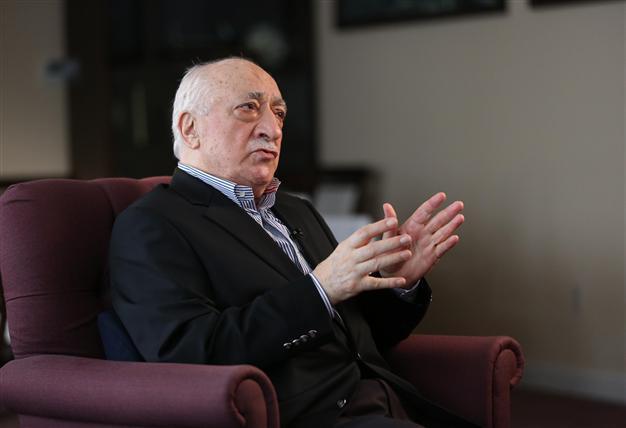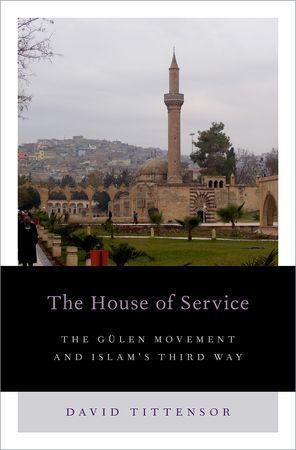The Gülen movement’s ‘House of Service’
William Armstrong - william.armstrong@hdn.com.tr
 ‘The House of Service: The Gülen Movement and Islam’s Third Way’ by David Tittensor (Oxford University Press, $49, 272 pages)
‘The House of Service: The Gülen Movement and Islam’s Third Way’ by David Tittensor (Oxford University Press, $49, 272 pages)This sloppy and frustrating new book is a real missed opportunity, coming at a time when the movement of Turkish Islamic scholar Fethullah Gülen is much in the headlines. Though billed by the publisher as a “groundbreaking new perspective” on the Gülen movement’s global operations, Australian academic David Tittensor’s unfocussed study fails to address many of the most pertinent questions about the subject. A number of titles on Gülen are now available in English and all have their drawbacks; unfortunately, this one has rather more drawbacks than most.
 The unique selling point comes from this book's deeper historical perspective, reaching back into the Ottoman period to detail the Gülen movement’s precursors. The author isn’t one of the dubious academics funded by the Gülenists to write puff piece scholarship, (a practice that he is critical of), but he does aim to defend it as part of a “historically authentic” tradition, against what he sees as delegitimizing attacks from mainstream Turkish historians. This defense includes a thorough account of the thought of Islamic scholar Said Nursi (1877-1960), one of Gülen’s key influences and regarded as one of the most important Turkish Islamic thinkers of the 20th century.
The unique selling point comes from this book's deeper historical perspective, reaching back into the Ottoman period to detail the Gülen movement’s precursors. The author isn’t one of the dubious academics funded by the Gülenists to write puff piece scholarship, (a practice that he is critical of), but he does aim to defend it as part of a “historically authentic” tradition, against what he sees as delegitimizing attacks from mainstream Turkish historians. This defense includes a thorough account of the thought of Islamic scholar Said Nursi (1877-1960), one of Gülen’s key influences and regarded as one of the most important Turkish Islamic thinkers of the 20th century. Nursi emphasized the compatibility between modernity and Islamic belief, seeking “to illustrate the compatibility of science and religion” and arguing “that traditional Islamic learning was insufficient and irrational and should be updated.” His ideas appealed to a large segment of Turkish society, but in the authoritarian secular atmosphere of the early Turkish Republic he was always viewed with suspicion by the state. Nevertheless, generations of followers such as Gülen were duly inspired, doing what Tittensor writes Anatolian Muslims “have been doing for centuries, and as such, should not be seen as a threat to the state but rather as an integral part of its DNA.”
Gülen first started attracting followers as a charismatic imam in the Aegean city of İzmir in the 1970s, gradually developing through the 1980s and 1990s into first a domestic and then an international network of “social businesses” that are “cause driven rather than profit driven.” Concomitant with this internationalization came a shift in the movement’s focus and a softening universalization of its rhetoric. The schools that have pioneered the expansion are entirely secular, their priority being to provide high-quality tutelage wherever they operate. The teachers may be religiously motivated, but all research indicates that their “missionary” zeal amounts to little more than presenting “example behavior,” in line with Gülen’s idea of fostering a “golden generation”: “Temsil” rather than “tebliğ,” exemplary behavior rather than outright proselytization, “with a view to inspiring the students to adopt [this lifestyle] for themselves.” The attraction for many of Gülen’s followers comes from his quest to holistically blend modernity with religious tradition, “rather than reject modernity and globalization, [Gülen] and his movement have embraced the current age and sought to incorporate it into an Islamic frame of reference.”
Tittensor explores in detail the international network of relations between Gülen-affiliated businesses, based on interviews with teachers and students at Gülen schools, as well as with representatives of related organizations. This is perhaps the most useful section of the book, but unfortunately things start to go off the rails soon afterward. As part of his stated quest to provide an “objective” and “detached” assessment, the author spends dozens of pages lamenting the “double standards” of international observers’ criticism of the movement’s shady practices. He puts this down to “Islamophobia” and contrasts it with what he says is the free pass given to equally questionable Christian charity World Vision. But the problem is that he isn’t able to give any concrete examples of this alleged unfair focus on the Gülen movement, nor of any “Islamophobic” press coverage of it. He does, however, spend pages criticizing the anti-Islamic sentiment around opposition to the post-9/11 Ground Zero mosque project in New York, though it isn’t clear what any of this has to do with Gülen. As such, it’s a bizarre editorial choice to drag a minor subject, which perhaps warranted only a footnote, across a whole central section of the book.
Suggesting that the international media has been too harsh on the Gülen movement misses the point completely. In fact, the opposite is the case: On the whole, the Gülenists have been given an extraordinarily easy ride. The post-9/11 environment saw Westerners casting around for moderate Islamic groups, and the Gülen movement was more than obliging to step into this role. It is only with a series of recent scandals in Turkey that serious questions have started to be asked of it abroad. These concerns generally don’t come from phantom fears about “proselytization” or “hidden agendas” in the movement’s international affiliates, but rather from its shady domestic operations. About these there is certainly much to be said, but Tittensor is extremely timid. He mentions the controversial legal case into the alleged “Ergenekon” deep state only once, but rather than discuss the judicial irregularities led by Gülen-linked prosecutors, he bizarrely suggests that the Gülenists have themselves been viewed by some as part of the same “Ergenekon” network. This is patently nonsense, and if it is not just a slip of the pen, it’s shocking that Tittensor could have such a shaky grasp on Turkey’s domestic politics. It’s probably just as well, therefore, that his book contains little on the movement’s relations with the current Justice and Development Party (AKP) government, and nothing on the ugly split between the two that exploded onto the agenda in December 2013.
So in the end this book is pretty thin gruel; a fragmented, poorly-organized read that skirts around the most pertinent questions. Though not without flaws itself, the best title yet to have appeared in English on the subject remains Joshua D. Hendrick’s “Gülen: The Ambiguous Politics of Market Islam in Turkey and the World” (reviewed here). Still, a comprehensive and detailed study of the Gülen movement has yet to appear in English. Given the state of uncertainty currently surrounding it, the dust will probably have to settle before that book is written.










